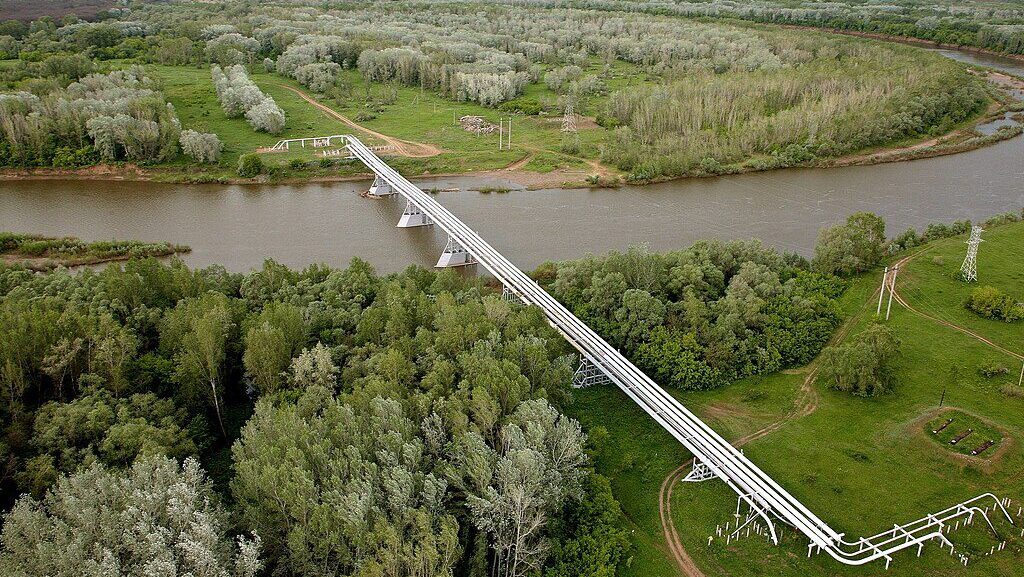
Gas pipelines in Russia
Photo: ГДО1968, CC BY-SA 4.0, via Wikimedia Commons
European officials are currently deliberating the reestablishment of Russian pipeline gas sales to the European Union, viewing it as a potential element in a broader settlement to bring an end to the conflict in Ukraine, sources familiar with the talks said.
According to the Financial Times, those in favour of importing Russian gas maintain that it would contribute to decreasing the high energy prices in Europe, encourage Moscow to come to the negotiating table, and give both sides a reason to implement and maintain a ceasefire.
A ceasefire and potential peace deal to end the Russo-Ukraine war are more likely than ever before, driven by new U.S. President Donald Trump’s intentions to stop funding and arming Kyiv, alongside Russian troops advancing and occupying more and more territory in eastern Ukraine.
Even Ukrainian President Volodymyr Zelensky has been talking of the need to end the war, tweeting on Wednesday, January 29th that “diplomatic solutions are preferable—fewer casualties, fewer losses.”
Ending the hot phase of the war is critical. Ukraine is its people. Legally and morally, our land belongs to our people. We will never recognize Russian occupation. Diplomatic solutions are preferable—fewer casualties, fewer losses. But Putin doesn’t want peace. He wants to…
— Volodymyr Zelenskyy / Володимир Зеленський (@ZelenskyyUa) January 29, 2025
As we recently reported, leaked details of Trump’s alleged peace plan, which envisions ending the war in a few months, have supposedly been discussed in the highest “political and diplomatic circles” of Kyiv.
The proposal to reestablish Russian gas imports has allegedly been endorsed by German and Hungarian officials, with support from other EU member states that see it as a way to reduce European energy costs.
Though imports of Russian gas have not been banned by the EU—in contrast to other energy sources such as coal and seaborne crude oil—the 27-member bloc wants to rid itself of all Russian fossil fuels by 2027.
Before Russia’s invasion of Ukraine three years ago, 40% of the EU’s gas supplies were provided by Russia, but that share dropped to about 8% by 2023, as most member states were eager to move away from their dependence on Moscow.
Norway and the United States were the top suppliers of gas in 2023, with the Nordic country providing almost 30% of all gas imports.
The move away from cheap Russian gas has caused energy prices in Europe to soar, with especially Central European countries, such as Germany, Austria, Slovakia, and Hungary feeling the brunt.
The current ruling party in Germany, the Social Democrats, used to have a pragmatic relationship with Russia, and the country’s economic growth was made possible by importing inexpensive Russian gas. Following Russia’s invasion of Ukraine, Germany stopped directly importing Russian gas, and the Nord Stream pipelines connecting the two countries were damaged in a series of explosions in 2022.
The sovereigntist governments of Hungary and Slovakia have continued importing gas from Russia, stating that politics and ideology should play no part in matters of energy security.
Both countries are in a dispute with Ukraine after the country recently refused to renew a transit agreement to carry Russian gas through Ukraine and into Central Europe. The move has especially affected Slovakia, which has threatened to take retaliatory measures. Hungary, however, has been able to secure an alternative route, importing Russian gas via Turkey.
A few weeks ago, Ukraine launched a—failed—military attack on the southern branch of the TurkStream gas pipeline, the only remaining pipeline to deliver Russian gas to the EU.
Hungarian PM Viktor Orbán urged Ukraine to show “respect” for both Hungary and Slovakia. In an interview for Kossuth Rádió on Friday, January 31st he said that Ukraine’s move to halt Russian gas transit to Central Europe and the resulting rise in energy prices was “unacceptable.” He added that Hungary would veto the next rollover of the sanctions imposed on Russia, due in around six months, if the EU fails to restore Russian gas transit through Ukraine.
❗️@PM_ViktorOrban on Kossuth Radio: Ukraine depends on us—without our support, its economy and war effort wouldn’t last a day. Yet, they disrupt Central Europe’s energy.
— Zoltan Kovacs (@zoltanspox) January 31, 2025
👉 We’ve received guarantees, but if they break their word, sanctions won’t just be questioned, they will be… pic.twitter.com/b2hAquDrCx
Responding to the Financial Times report, an EU spokesperson rejected any connection between the possibility of resuming Russian pipeline gas purchases and peace talks on ending the Russia-Ukraine war.
Lithuanian Energy Minister Žygimantas Vaičiūnas said this option should not be under discussion right now. A few days ago, Poland’s president Andrzej Duda also said that gas flows from Russia to Western Europe should never be restored, even if Russia and Ukraine reach a peace deal.
